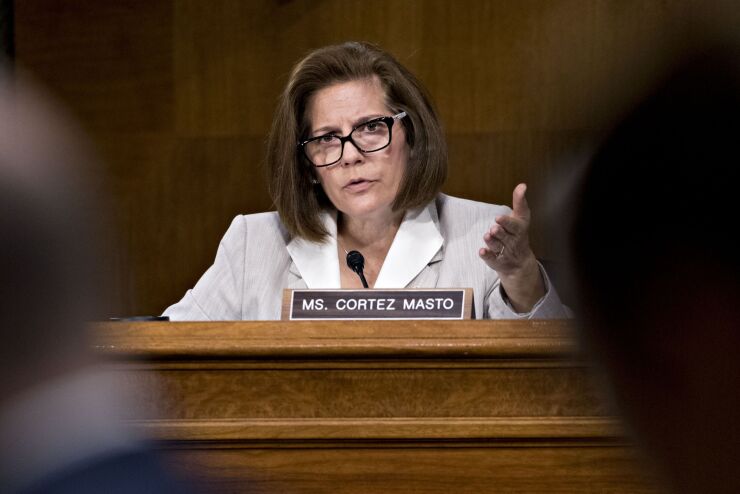WASHINGTON — Senate Democrats lambasted Consumer Financial Protection Bureau Director Kathy Kraninger for finalizing a rule during the coronavirus pandemic that eliminates underwriting requirements for payday lenders.
At a hearing before the Senate Banking Committee on Wednesday, Democrats on the panel homed in on the payday rule in criticizing the agency's record protecting consumers during the pandemic crisis.
“With respect to the payday lending rule changes that you made … it is outrageous that in the middle of this pandemic when so many people are struggling to make ends meet you’ve provided this big payday to payday lenders at the expense of the consumer,” said Sen. Chris Van Hollen, D-Md. “It’s bad at any time, but especially egregious at a moment when so many families are struggling to make ends meet.”
The CFPB earlier this month completed the rule long sought by Trump administration appointees that rescinds ability-to-repay requirements for small-dollar lenders. The tough underwriting standards were part of a previous rule issued in 2017 under then-CFPB Director Richard Cordray, an Obama appointee.

Democrats scrutinized the CFPB’s process for finalizing the rule under Kraninger’s leadership, after reporting by The New York Times that the agency watered down research and downplayed findings about the harm to consumers if the underwriting requirements were eliminated.
“Is it appropriate for the CFPB to ignore research to repeal this rule?” said Sen. Sherrod Brown of Ohio, the top Democrat on the committee. “The fact that you proceeded to finalize a rule, Director, despite a clear corrupted process, that you’ve read, raises questions about whether you follow the law.”
Kraninger defended the process for approving the regulation, saying “the full record is available in the rulemaking process, both the 2017 process and the updated process.”
Republicans argued that the new payday lending rule will improve consumers' access to credit.
“The availability of short-term, small-dollar credit is essential to millions of Americans,” Crapo said. “Updating this rule is an important step toward ensuring the availability of credit that is essential to so many consumers who struggle to access or qualify for other options.”
Kraninger said that the previous payday regulation would have reduced access to credit by 70%, and that the new rule was intended to promote competition in the business and enable banks and credit unions to offer small-dollar lending products.
“Promoting competition and enabling consumers to understand the products that are available to them is a huge part of where we are today,” Kraninger said.
But Sen. Catherine Cortez Masto, D-Nev., charged that it was hypocritical for the CFPB to rescind ability-to-repay requirements in the payday lending rule when the agency generally weighs a company’s ability to pay a fine when settling enforcement matters with a firm.
Cortez Masto cited a suspended CFPB penalty against a Florida company that allegedly charged millions of dollars in illegal fees to customers. The company ultimately paid only a small portion of the fees as a penalty.
Kraninger told Cortez Masto that the CFPB generally estimates how much effort it would take for the agency to recoup funds from a company that does not have the funds to pay, when determining settlement amounts.
“Do you see the hypocrisy here?” Cortez Masto said. “That you have bad players in payday lending. That you determine whether they have the ability to pay their judgments and then you bail them out by using this civil monetary fund. But then actually the borrower of the payday lender, you don’t look at the ability to repay. And there’s predatory lenders out there.”
Sen. Elizabeth Warren, D-Mass., took issue with a memo the CFPB issued to mortgage servicers saying the agency would not penalize them as long as they were acting in “good faith.” Warren said a tougher stance was necessary in light of consumer complaints about servicers filed with the CFPB that spiked at the start of the pandemic.
Kraninger defended the CFPB’s response to mortgage complaints, saying the number of complaints in that area has decreased since the beginning of the pandemic. She also pointed to “the discretion that all law enforcement entities have with the cases they take on and where they spend their energy.”
But Warren described Kraninger’s guidelines as a “get out of jail free card,” and called on her to step down.
“Your leadership has been a miserable failure,” Warren said. “Based on your actions in this pandemic, you should resign.”
Sen. Jon Tester, D-Mont., said Kraninger was not appropriately answering questions from committee members.
“I will tell you that Director Kraninger is very, very good at not answering questions,” Tester said. “By the way, that’s not a good quality. … These hearings with Director Kraninger have been a total waste of time.”





